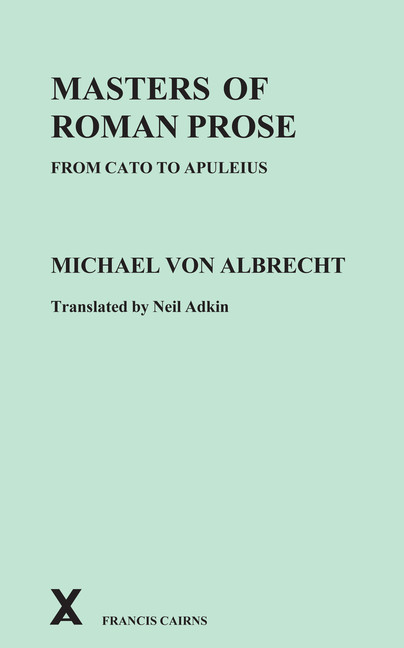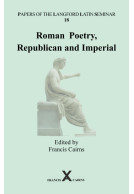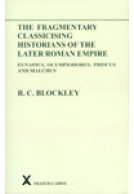Masters of Roman Prose from Cato to Apuleius (Paperback)
Interpretive Studies
Imprint: Francis Cairns Publications
Pages: 192
ISBN: 9780995461208
Published: 31st October 2016
Script Academic & Professional
Pages: 192
ISBN: 9780995461208
Published: 31st October 2016
Script Academic & Professional
You'll be £35.00 closer to your next £10.00 credit when you purchase Masters of Roman Prose from Cato to Apuleius. What's this?
+£4.99 UK Delivery or free UK delivery if order is over £40
(click here for international delivery rates)
Order within the next 49 minutes to get your order processed the next working day!
Need a currency converter? Check XE.com for live rates
(click here for international delivery rates)
Order within the next 49 minutes to get your order processed the next working day!
Need a currency converter? Check XE.com for live rates
In this commented anthology of Latin prose, Michael von Albrecht selects texts from a span of Roman literature covering four centuries. A summary of the contents will indicate its range and variety: M. Porcius Cato (the preface to De agricultura , a passage from the speech for the Rhodians of 167 B.C., and a section from the Origines ); republican oratory (C. Gracchus, from De legibus promulgatis of 122 B.C. and Cicero from In Verrem II ); Caesar as orator and historian; two passages of Sallust; a comparison of Claudius Quadrigarius and Livy as historiographers; philosophical texts from Cicero and the Younger Seneca; and chapters on Petronius, Tacitus, Pliny the Younger, and Apuleius.
The method of the book is practical, based on actual interpretation of specific texts rather than on literary theory (ancient or modern). Each text (printed first in Latin and then in English) is followed by a detailed and flexible discussion, somewhere between essay and commentary. No set pattern is imposed - rather the nature of the text governs the shape of its analysis - but Professor von Albrecht's vivid scholarly exposition covers most dimensions of the art of Latin prose-writing. The book's variety of texts and close treatment of specific Latin passages make it an ideal coursebook for the study of Latin prose. But behind its accessibility lies scholarship of the highest order: Professor von Albrecht's exemplary erudition reveals itself in the extensive annotation underpinning his main text; and researchers in any of the fields covered by Latin prose-writers - philosophy, politics, history, letters, practical handbooks, entertainment - will find this book a valuable resource. This book was originally published in German ( Meister römischer Prosa von Cato bis Apuleius , 1971). It has been accurately and sympathetically translated by Neil Adkin.
Other titles in Francis Cairns Publications...












